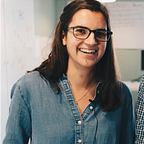Entrepreneur. Who? Me?!
Lately, I’ve been telling people that I’m an accidental entrepreneur. I say that stories about Elon Musk and Mark Zuckerberg never really resonated or motivated me. I say that I never wanted to start a company. I say that I just found a problem and then kind of tripped and fell by happy accident into the world of entrepreneurship. I think it’s my way of apologizing for daring to be in a role that I still don’t feel like I can live up to.
I can get up in front a room of 100 people and tell them with confidence (and many enthusiastic hand gestures) that I’m using entrepreneurship as a tool to tackle a problem I care a lot about solving. But I can’t look you in the eye and tell you I’m an entrepreneur without feeling like I’m lying to you.
The identity of Maria as an “entrepreneur” just doesn’t feel like me. And to a certain extent, it doesn’t really matter. I don’t care what you call me, or what I call myself.
I do care, though, if there is another Maria out there whose disconnect with the identity of “entrepreneur” prevents her from unlocking entrepreneurship as a tool to work on something that matters. A Maria who at six years old dug up rocks from her backyard and laid them carefully on display on top of an upside-down cardboard box and convinced her neighbors to buy them for $1 each. A Maria who chose to study civil engineering because she loved the idea that the fun of working through a tough math problem could actually help make someone’s life better. A Maria who heard a story about kids swimming across a river to get to school and worked her way onto the Board of Directors of a non-profit that builds footbridges to solve that problem.
How many Marias are out there who have the potential to build great companies, but never do?
If I think about the things I’ve done up until now, I’m starting to recognize flashes of the things we look for in the entrepreneurs we recruit — an instinct to stray from the beaten path and challenge rules that don’t make sense, the curiosity and imagination to approach problems in new and different ways, the ability to attract people and resources behind a mission to build something new, and an immutable default to action in the face of ambiguity.
Until now, it has never occurred to me to think of those things as entrepreneurial.
In high school, I set up an operation that produced and sold hand-made greeting cards and ended up doing thousands of dollars in sales. But because I did it to raise money for an organization I cared about, I never thought about it as a business, and neither did anybody else. The people around me applauded me for my passion and commitment to service, but nobody took me aside and told me I was thinking like an entrepreneur.
In college, I founded an organization called Duke Engineers for International Development out of frustration with the status quo of how engineering service projects were being funded and executed. This time, I was complimented on my leadership skills and commitment to social impact and several people encouraged me to pursue a career in the non-profit sector, kindly telling me that they thought I would go far rising in the ranks of whatever organization I chose to work for. Nobody pointed out how my instinct to build something new as a reaction to seeing something that was broken is the essence of an entrepreneur.
In my case, I think that working on projects that were oriented towards impact distanced me from the label of entrepreneur in the minds of the people around me (and, therefore, my own mind). I also wonder if being a woman predisposed people to interpret my actions as less entrepreneurial than they would a man in the same role.
I feel strongly that as we recruit for our next INVANTI cohort, we cannot limit ourselves to people who self-identify as entrepreneurs. Each time we post on Twitter or Facebook encouraging “aspiring entrepreneurs” to apply, a voice in my head wonders if I would have even clicked through to learn more, or if I would have seen “entrepreneur” and thought “that’s not for me”. And I wonder how many people we’re missing who reject the identify of entrepreneur because of the role gender, race, age, and other factors have played in the interpretation of the characteristics that make them entrepreneurial.
If you or someone you know is passionate about working on important problems and has a track record of initiating things, reach out. There is a place for you at INVANTI.
Maria Gibbs is a cofounder of INVANTI.
Don’t wait for an “A-HA!” moment to start building a company that matters — applications for Cohort 2 are now open: https://www.invanti.co/apply/
